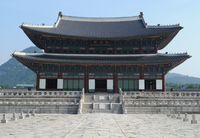
Back مردم یمائک Persian Yemaek French Yemaek ID 濊貊 Japanese 예맥 Korean Yemaek Polish Е (племенной союз) Russian เยแม็ก Thai Yemaek Turkish Веймо Ukrainian
| Yemaek | |
| Hangul | 예맥 |
|---|---|
| Hanja | |
| Revised Romanization | Yemaek |
| McCune–Reischauer | Yemaek |
| History of Korea |
|---|
 |
| Timeline |
|
|
Yemaek or Yamaek (Korean pronunciation: [jemɛk]) was an ancient tribal group in the northern Korean Peninsula and Manchuria who are regarded by many scholars as the ancestors of modern Koreans.[1][2][3][4] According to iGENEA, a leading European genealogy service, their current research suggests that "modern Koreans are descended from the Yemaek people."[5] The Yemaek had ancestral ties to various Korean kingdoms including Gojoseon, Buyeo, Goguryeo, and tribes including Okjeo, Dongye (Ye), Yangmaek (양맥; 梁貊) and Sosumaek (소수맥; 小水貊).[6]
- ^ Pai, Hyung Il (2000). Constructing "Korean" Origins: A Critical Review of Archaeology, Historiography, and Racial Myth in Korean State-formation Theories. Harvard University Asia Center. p. 86. ISBN 9780674002449.
As the first "Koreans", the Yemaek are considered responsible for the formation of Tan'gun's kingdom of Kochoson
- ^ Xu, Stella Yingzi (2007). That Glorious Ancient History of Our Nation: The Contested Re-readings of "Korea" in Early Chinese Historical Records and Their Legacy on the Formation of Korean-ness. Ann Arbor. p. 220. ISBN 9780549440369. ProQuest 304872860.
The majority of the Kija Choson and Wiman Choson people were Yemaek, the ancestors of the Korean people
{{cite book}}: CS1 maint: location missing publisher (link) - ^ Preucel, Robert; Mrozowski, Stephen; Nelson, Sarah (2010). Contemporary Archaeology in Theory: The New Pragmatism (2nd ed.). Wiley-Blackwell. p. 218-221.
- ^ Park, Kyeong-chul (December 2004). "History of Koguryŏ and China's Northeast Asian Project". International Journal of Korean Histor. 6: 2-5.
- ^ "Ancient tribe Koreans - Ancestry and origin". iGENEA. Retrieved 29 January 2023.
- ^ Park, Kyeong-chul (December 2004). "History of Koguryŏ and China's Northeast Asian Project". International Journal of Korean Histor. 6: 4-5.
© MMXXIII Rich X Search. We shall prevail. All rights reserved. Rich X Search